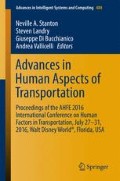Abstract
Camping is a pleasurable yachting activity that enables people to visit beautiful and pristine lagoons, rivers, canals, lakes and marine reserves. The water in these places is often very shallow and there are no landing stages. This calls for a type of vessel suitable for coastal yachting and navigating inland waters. A small yacht can be considered ideal for this purpose. The concept proposed is a small trailerable sailboat for camping, with special performance, from both the naval and ergonomic point of view. This concept introduces the ideas of easy management of the sailing performance, housing activity, beaching and transportation, and an insight into the tactile pleasure of the deck surfaces. This first phase of the research reports a series of critical reflections related to the conscious design of small yachts, taking into account of various aspects: the environmental context, on-board activities, out-board activities and general management of the yacht.
Access this chapter
Tax calculation will be finalised at checkout
Purchases are for personal use only
Notes
- 1.
With the expression sustainable development, introduced in the international discussion from the document of the World Commission for Environment and Development Our Common Future, 1987, it refers to all the relationships between human activities and biosphere, such as to afford to human life continue, individuals to meet their needs and different cultures to develop without destroying the global biophysical context.
- 2.
Natural capital is the set of non-renewable resources and systemic capacity of the environment to reproduce renewable resources. The importance of investing in natural capital has been highlighted in an article by many hands, entitled The value of the world's ecosystem services and natural capital, appeared in May 1997 on Nature.
- 3.
The field of application of the cultural economy, limited for a long time only to art, according to the Anglo-Saxon tradition, has recently extended its field of action to the show until the museums’ economy and heritage, see Benhamou [1].
- 4.
De Masi (2000, pp. 243–264).
- 5.
Urry [2].
- 6.
Marano [4].
References
Benhamou, F.: L’economia della cultura, tr. it., Il Mulino, Bologna (2001)
Urry, John: Lo sguardo del turista. Il tempo libero e il viaggio nelle società contemporanee, Seam, Roma (1995)
Vezzoli, C.: System design for sustainability, Maggioli editore (2007)
Marano, A.: Design e ambiente. La valorizzazione del territorio tra storia umana e natura, POLI.design, Milano (2004)
Di Bucchianico, G., Vallicelli, A.: User-Centered Approach for Sailing Yacht Design. In: Karwowski, W., Soares, M.M., Stanton, N.A. (eds.) Human Factors and Ergonomics in Consumer product Design. Uses and Applications. Boca Raton (FL): CRC Press, Taylor & Francis Group (2011)
Rossi, E., Di Bucchianico, G., Di Nicolantonio, M.: 10 Meters Daysailer “for All”. Sustainable Technological Solutions for Easy Navigation. In: Peter V. (ed.) Advances in Social and Organizational Factors. Boca Raton (FL, USA), CRC Press (Taylor & Francis Group) (2012)
Acknowledgments
This paper refers to the results achieved within a Master’s degree Thesis in yacht design entitled “ISISI” (advisor: Prof. A. Vallicelli,; candidate: D. Maddaluno), edited in the “Interior Design of Sustainable Living” Degree Laboratory, at the Department of Architecture of the University of Chieti-Pescara (Italy). All the images reported in this paper are taken from the above mentioned M.Sc. Thesis. The development of the research referred to the technological solutions for a new concept of small camping sailing yacht, conducted directly from the M.Sc. candidate D. Maddaluno under the guide of Prof. A. Vallicelli. The various paragraphs of the present paper can be considered the consequence of a common discussion and a collective review among authors. In particular, the writing of the various paragraphs can be attributed to: Massimo Di Nicolantonio (Abstract, Paragraph 4 and 5), Jessica Lagatta (Paragraph 3), Antonio Marano (Paragraph 1) Andrea Vallicelli (Paragraph 2).
Author information
Authors and Affiliations
Corresponding author
Editor information
Editors and Affiliations
Rights and permissions
Copyright information
© 2017 Springer International Publishing Switzerland
About this paper
Cite this paper
Di Nicolantonio, M., Lagatta, J., Marano, A., Vallicelli, A. (2017). Boat Camping Sailing Yacht: A Study Case of Conscious Yacht Design. In: Stanton, N., Landry, S., Di Bucchianico, G., Vallicelli, A. (eds) Advances in Human Aspects of Transportation. Advances in Intelligent Systems and Computing, vol 484. Springer, Cham. https://doi.org/10.1007/978-3-319-41682-3_88
Download citation
DOI: https://doi.org/10.1007/978-3-319-41682-3_88
Published:
Publisher Name: Springer, Cham
Print ISBN: 978-3-319-41681-6
Online ISBN: 978-3-319-41682-3
eBook Packages: EngineeringEngineering (R0)

